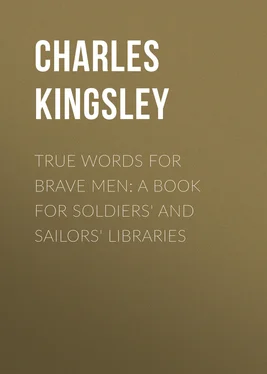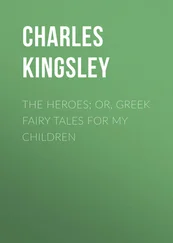Charles Kingsley - True Words for Brave Men - A Book for Soldiers' and Sailors' Libraries
Здесь есть возможность читать онлайн «Charles Kingsley - True Words for Brave Men - A Book for Soldiers' and Sailors' Libraries» — ознакомительный отрывок электронной книги совершенно бесплатно, а после прочтения отрывка купить полную версию. В некоторых случаях можно слушать аудио, скачать через торрент в формате fb2 и присутствует краткое содержание. Издательство: Иностранный паблик, Жанр: foreign_prose, foreign_religion, Философия, foreign_psychology, foreign_antique, на английском языке. Описание произведения, (предисловие) а так же отзывы посетителей доступны на портале библиотеки ЛибКат.
- Название:True Words for Brave Men: A Book for Soldiers' and Sailors' Libraries
- Автор:
- Издательство:Иностранный паблик
- Жанр:
- Год:неизвестен
- ISBN:нет данных
- Рейтинг книги:3 / 5. Голосов: 1
-
Избранное:Добавить в избранное
- Отзывы:
-
Ваша оценка:
- 60
- 1
- 2
- 3
- 4
- 5
True Words for Brave Men: A Book for Soldiers' and Sailors' Libraries: краткое содержание, описание и аннотация
Предлагаем к чтению аннотацию, описание, краткое содержание или предисловие (зависит от того, что написал сам автор книги «True Words for Brave Men: A Book for Soldiers' and Sailors' Libraries»). Если вы не нашли необходимую информацию о книге — напишите в комментариях, мы постараемся отыскать её.
True Words for Brave Men: A Book for Soldiers' and Sailors' Libraries — читать онлайн ознакомительный отрывок
Ниже представлен текст книги, разбитый по страницам. Система сохранения места последней прочитанной страницы, позволяет с удобством читать онлайн бесплатно книгу «True Words for Brave Men: A Book for Soldiers' and Sailors' Libraries», без необходимости каждый раз заново искать на чём Вы остановились. Поставьте закладку, и сможете в любой момент перейти на страницу, на которой закончили чтение.
Интервал:
Закладка:
And all the while He will have them labour . He will make them try their strength, and use their strength, and improve their strength of soul and body. By making them labour, Christ teaches His people industry, order, self-command, self-denial, patience, courage, endurance, foresight, thoughtfulness, earnestness. All these blessed virtues come out of holy labour; by working in welldoing we learn lessons which the savage among his delicious fruits and flowers, in his life of golden ease, and luxurious laziness, can never learn.
And all this Christ teaches us because He loves us, because He would have us perfect. His love is unchangeable. As He swore by Himself that He would never fail David, so He has sworn that He will never fail any one of His Churches, or any one of us. Lo, said He, I am with you always, even to the end of the world. Nothing shall separate us from the love of Christ; neither battle nor famine, nor anything else in heaven or earth. All He wants is to educate us, because He loves us. He doth not afflict willingly nor grieve the children of men. And because He is a God of love, He proves His love to us every now and then by blessing us, as well as by correcting us; else our spirits would fail before Him, and the souls which He has made. When He sees our adversity, He hears our complaint, He thinks upon His covenant and pities us, according to the multitude of His mercies. “A fruitful land maketh He barren for the wickedness of them that dwell therein, yet when they cry unto the Lord in their trouble, He delivereth them out of their distress. He maketh the wilderness standing water, and water springs of dry ground, and there He setteth the hungry that they may build them a city, that they may sow their lands and plant vineyards, to yield them fruits of increase. He blesseth them, so that they multiply exceedingly, and suffereth not their cattle to decrease; and again, when they are diminished or brought low through affliction, through any plague or trouble, though He suffer them to be evil entreated by tyrants, and let them wander out of the way in the wilderness; yet helpeth He the poor out of misery, and maketh them households like a flock of sheep.” (Ps. cvii.)
O my friends, have not these words ever been wonderfully fulfilled to some of you! Then see how true it is that God will not always be chiding, neither keepeth He His anger for ever; but He knoweth our frame, He remembereth that we are but dust, and like as a father pitieth his children, so does He pity those who fear Him; and oftentimes, too, in His great condescension, those who fear Him not.
My friends, I have been trying in this sermon to make you feel that you are under God’s guidance, that His providence is trying to train and educate you. I have told you that there is a blessed use and meaning in your very sorrows, and in this life of continual toil which God has appointed for you; I have told you that you ought to thank God for those sorrows: how much more then ought you to thank Him for your joys. If you should thank Him for want, surely you should thank Him for plenty. O thank Him earnestly—not only with your lips, but in your lives. If you believe that He has redeemed you with His precious blood, show your thankfulness by living as redeemed men, holy to God—who are not your own, but bought with a price; therefore show forth God’s glory, the power of His grace in your bodies and your spirits which are His. If you feel that it is a noble thing to be an Englishman—especially an English soldier or an English sailor—a noble and honourable privilege to be allowed to do your duty in the noblest nation and the noblest church which the world ever saw—then live as Englishmen in covenant with God; faithful to Him who has redeemed you and washed you from your sins in His own blood. Do you be faithful and obedient to Christ’s Spirit, and He will be faithful to those promises of His. Though a thousand fall at thy right hand, yet the evil shall not come nigh thee. Blessed are all they that fear the Lord and walk in His ways. For thou shalt eat the labours of thine hand. O well art thou and happy shalt thou be. The Lord out of heaven shall so bless thee, that thou shalt see England in prosperity all thy life long. Yea, thou shalt see thy children’s children, and peace upon thy native land.
Oh, remember how God fulfilled that promise to England seventy years ago, when the French swept in fire and slaughter, and horrors worse than either, over almost every nation in Europe, while England remained safe in peace and plenty, and an enemy never set foot on God’s chosen English soil. Remember the French war, and our salvation in it, and then believe and take comfort. Trust in the Lord and be doing good; dwell in the land, and verily thou shalt be fed.
VII. HIGHER OR LOWER: WHICH SHALL WIN?
“Therefore, brethren, we are debtors, not to the flesh, to live after the flesh. For if ye live after the flesh, ye shall die: but if ye through the spirit do mortify the deeds of the body, ye shall live. For as many as are led by the spirit of God, they are the sons of God. For ye have not received the spirit of bondage again to fear; but ye have received the Spirit of adoption, whereby we cry, Abba, Father.”
—Romans viii. 12-15.Let us try to understand these words. They are of quite infinite importance to us all.
We shall all agree, all of us at least who have thought at all about right and wrong, and tried to do right and avoid wrong—that there goes on in us, at times, a strange struggle. We wish to do a right thing, and at the very same time long to do a wrong one. We are pulled, as it were, two different ways by two different feelings, feel as if we were two men at once, a better man and a worse man struggling for the mastery. One may conquer, or the other. We may be like the confirmed drunkard who cannot help draining off his liquor, though he knows that it is going to kill him; or we may be like the man who conquers his love for drink, and puts the liquor away, because he knows that he ought not to take it.
We know too well, many of us, how painful this inward struggle is, between our better selves, and our worse selves. How discontented with ourselves it makes us, how ashamed of ourselves, how angry with ourselves. We all understand too well—or ought to understand, St. Paul’s words: How often the good which he wished to do, he did not do, but the evil which he did not wish to do, he did. How he delighted in the law of God in his inward man; but he found another law in him, in his body, warring against the law of his mind—that is his conscience and reason, and making a slave of him till he was ready at times to cry, “Oh wretched man that I am, who shall deliver me from the body of this death?”
We can understand too, surely the famous parable of Plato, the greatest of heathen philosophers, who says, that the soul of man is like a chariot, guided by a man’s will, but drawn by two horses. The one horse he says is white, beautiful and noble, well-broken and winged, too, always trying to rise and fly upward with the chariot toward heaven. But the other horse is black, evil, and unmanageable, always trying to rush downward, and drag the chariot and the driver into hell.
Ah my friends, that is but too true a picture of most of us, and God grant that in our souls the better horse may win, that our nobler and purer desires may lift us up, and leave behind those lower and fouler desires which try to drag us down. But to drag us down whither? To hell at last, says Plato the heathen. To destruction and death in the meanwhile, says St. Paul.
Now in the text St. Paul explains this struggle—this continual war which goes on within us. He says that there are two parts in us—the flesh and the spirit—and that the flesh lusts, that is, longs and struggles to have its own way against the spirit, and the spirit against the flesh. First, there is a flesh in us—that is, a carnal animal nature. Of that there can be no doubt: we are animals, we come into the world as animals do—eat, drink, sleep as they do—have the same passions as they have—and our carnal mortal bodies die at last, exactly as the animals die.
Читать дальшеИнтервал:
Закладка:
Похожие книги на «True Words for Brave Men: A Book for Soldiers' and Sailors' Libraries»
Представляем Вашему вниманию похожие книги на «True Words for Brave Men: A Book for Soldiers' and Sailors' Libraries» списком для выбора. Мы отобрали схожую по названию и смыслу литературу в надежде предоставить читателям больше вариантов отыскать новые, интересные, ещё непрочитанные произведения.
Обсуждение, отзывы о книге «True Words for Brave Men: A Book for Soldiers' and Sailors' Libraries» и просто собственные мнения читателей. Оставьте ваши комментарии, напишите, что Вы думаете о произведении, его смысле или главных героях. Укажите что конкретно понравилось, а что нет, и почему Вы так считаете.












